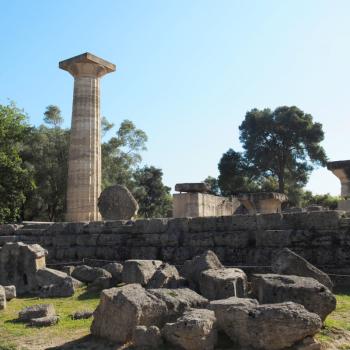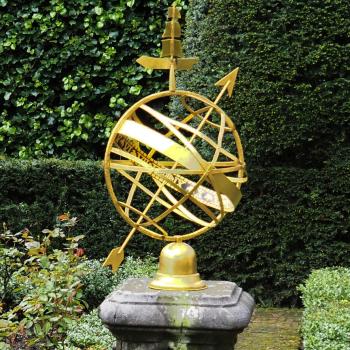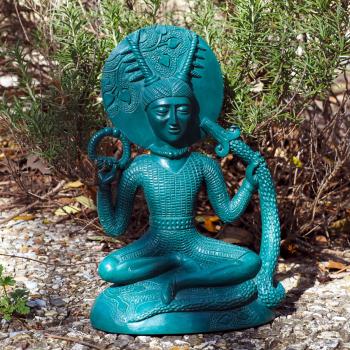Kris Hughes (that’s this Kris Hughes, not Kristoffer Hughes) had a good question on Facebook last weekend: “What do you think about the concept of patron deities?” There was quite a bit of conversation on Facebook, and as Kris requested, it was respectful. Which is good, because some people get very worked up around the concept of patron deities.
I have thoughts on this (when do I ever not have thoughts on an issue?). They aren’t necessarily “right” thoughts, but they’re my thoughts and I like to think they’re reasonable thoughts.
Here’s the short answer: patron deities are a real and valid thing in contemporary Paganism. But they aren’t for everyone, and they aren’t the most important thing in the world, even for polytheists. Especially for polytheists.
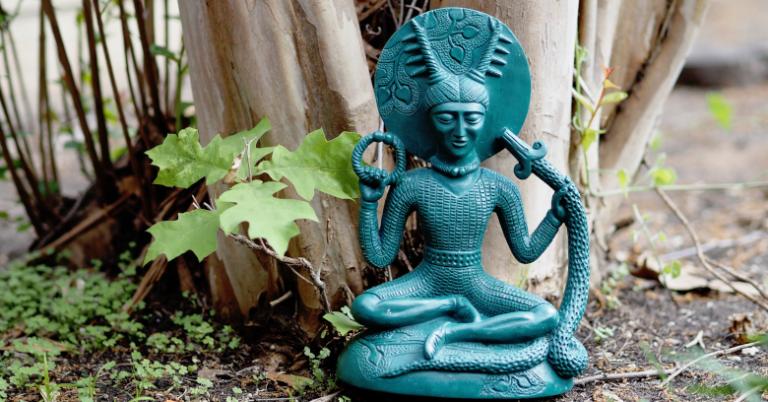
Patronage in the ancient world
Search Wikipedia for “patron deity” and it redirects to “tutelary deity” which it defines as:
a deity or a spirit who is a guardian, patron, or protector of a particular place, geographic feature, person, lineage, nation, culture, or occupation.
The rest of the Wikipedia page isn’t the best, but it’s enough to give you an idea of what a patron deity is and does.
In the ancient world, most patron deities were patrons of groups: of tribes, nations, or cities. Athena was the patron deity of Athens. If you were born an Athenian you didn’t have to wonder who your patron deity was – you knew. There were individual exceptions, but they were the exception, not the rule.
At the family and individual level, most tutelary spirits were ancestors.
Beliefs and practices varied widely from place to place and culture to culture, but the idea of a personal patron deity was uncommon in the ancient world.
Group patronage is mostly dead
Today, Greece is 90% Orthodox Christian. Ireland is 78% Catholic Christian (a number that is rapidly declining). The patronage relationships between Gods and groups of people are mostly gone. If people have tutelary spirits, they’re likely to be angels, or saints… or some celebrity they improperly call their “spirit animal.” That’s another post for another time – and honestly, one I have little interest in writing.
The old patronage arrangements are gone. So if Athena wants to participate in a patronage-based relationship, there’s not much to work with in Athens – the vast majority of Athenians don’t recognize Her as a Goddess.
But She has followers and devotees around the world.
(That doesn’t mean Athena isn’t still the Goddess of Athens – She is. It does mean there aren’t very many people in Athens who acknowledge Her as such. Place-based relationships are a different topic.)
People have Gods and Gods have people. Where once Gods were able to find Their people all in one place, now They find Their people in many places. And those people are, for the most part, not connected to each other. So it makes sense that Gods who were patron deities once and who wish to be patron deities again will form patronage relationships with individual humans.
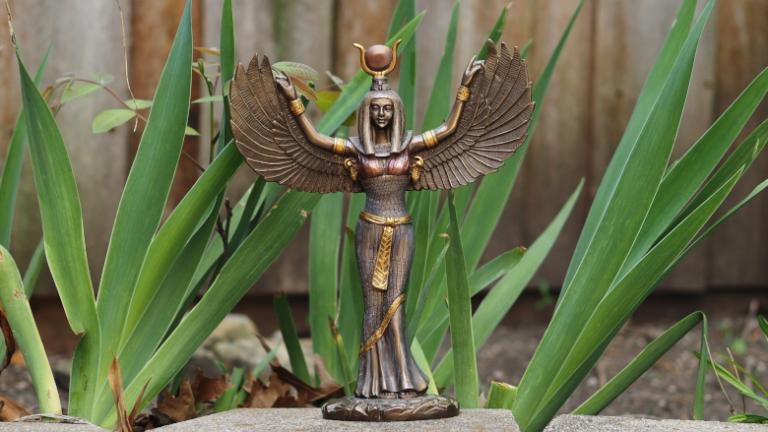
Not everyone needs a patron deity
More than a few Paganism 101 and witchcraft 101 books list “find your patron deity” as an early step on your spiritual journey. As though everyone should have a patron deity, and that finding one is a simple matter. Neither of those ideas is correct.
Being called by a God is an amazing thing. But it’s not something that happens to everyone – my informal observation is that it happens to only a few. And that’s fine – neither Paganism nor polytheism require a call.
Anyone can worship any God! Some traditions and cultures have boundaries as to who can be a member of that community – boundaries we should respect – but gatekeeping the Gods is neither necessary nor possible… nor particularly wise.
Are you interested in a specific deity? Do Their values and virtues appeal to you? Do Their stories resonate with you? Then start worshipping them. Pray, meditate, and make offerings. Do it consistently and see what happens. Most times They respond in a positive manner. Let the relationship develop organically – let Them tell you what They want from you, and what They offer you in return.
Introducing yourself to a God with “will you be my patron?” isn’t very different from introducing yourself to another human and asking “will you marry me?”
Maybe, but it’s a bit early for that.
Patronage is only one form of human-divine relationship
This isn’t all that different from people who think that in order to be a “real” Pagan or polytheist they must be a priest of this God or that Goddess. Priesthood is a formal, oathed relationship to perform certain duties for a deity or group of deities. Gerald Gardner’s idea that every Wiccan initiate is a priest or priestess simply means that we don’t need priests to access the Gods – we can do it ourselves. Being a priest is a commitment to do a set of specific things. Not everyone is called to make that commitment. Most aren’t, and that’s fine.
I am a priest of Cernunnos and of Danu. I have a sworn relationship with the Morrigan, but it is not one of priesthood. None of those relationships are based in patronage.
And there are many other sacred callings that are neither priesthood nor patronage.
Someone in Kris’s Facebook feed said that having a patron deity is a form of henotheism – the idea that there are many Gods, but only one is your God or the God of your people. I don’t think I would describe it like that. I would say that in henotheism, you only worship one God. In patronage, you may worship several Gods, but your patron is always first – and you’re higher on Their list than the average human.
I worship several Gods, but Cernunnos is always first. Is that patronage? That’s not a term I’ve ever used to describe this relationship. This is first and foremost a relationship between a God and a devotee. Everything after that is extra.
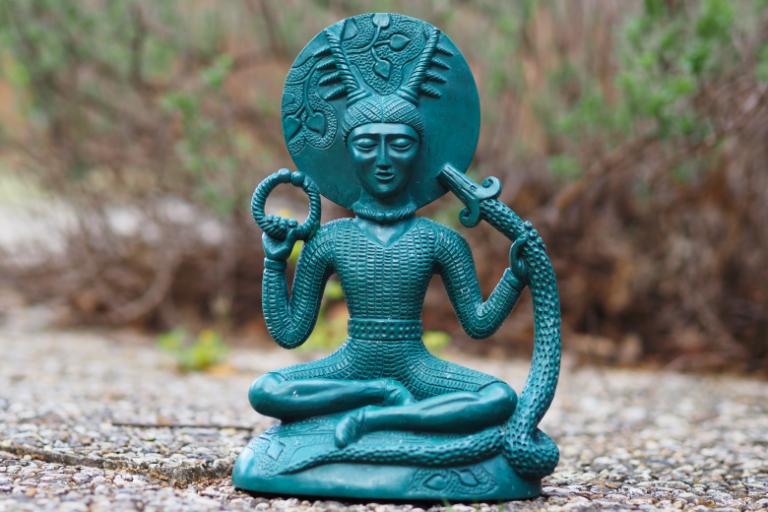
“A personal relationship with Jesus”
Mention patron deities and sooner or later someone is going to say that the idea is baggage brought into Paganism by former Evangelical Christians who grew up hearing about the necessity of “a personal relationship with Jesus.” I’m sensitive to that charge – I grew up in that environment. Recovering from it has been the work of a lifetime, and the last thing I want to do is bring unhelpful concepts from my old religion into my new religion.
It sounds similar. I have no doubt some formerly-Evangelicals-now-Pagans have inadvertently done this.
But it’s not the same.
Divine patronage was part of the ancient Pagan world – it pre-dates Christianity, much less Evangelical Protestantism. That patronage has shifted from a group thing to an individual thing is a secondary issue. This idea was ours long before they were here.
But more importantly, “a personal relationship with Jesus” is a marketing phrase, not a theological statement. What it means in practice is affirming a set of doctrinal propositions beginning with Original Sin and continuing through the Apostles’ Creed. The “relationship” is not a reciprocal arrangement with the divine person called Jesus, but submission to a set of beliefs about Jesus made up by men long after His death.
I wish more Christians did have a personal relationship with Jesus. Maybe they’d be more Christ-like and stop voting for people like Donald Trump and Ron DeSantis.
Good ideas and sound practices are good and sound in any religious tradition. Don’t let an Evangelical marketing phrase make you think there’s something wrong with the idea of having a patron deity.
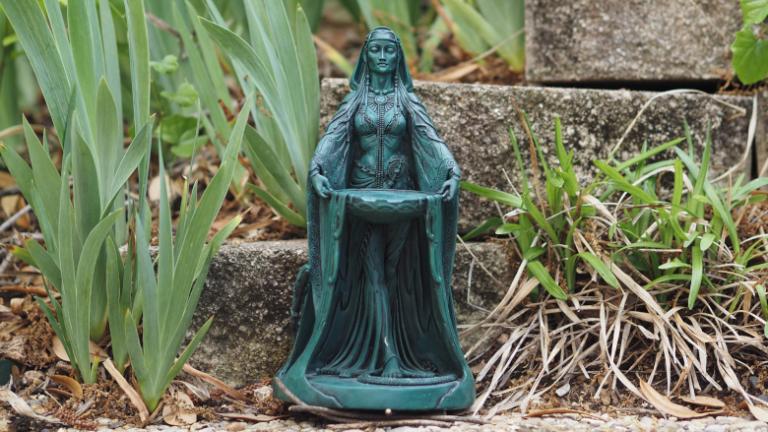
Ancestors are usually the most accessible spirits
If you’re looking for a spirit person to protect and guide you, the first place to look is among your own ancestors. Gods are often busy doing God things – some polytheists believe that individual Gods take little interest in individual humans. I’m not one of them, but I also understand that while sometimes the Gods seem far away, ancestors are almost always there.
Ancestors have a personal interest in your success – you are the continuation of their line. Some of them knew you in this life. Others knew the ancestors who did know you. Part of them lives on in you… and this is true for our ancestors of spirit as well as for our ancestors of blood.
If you’re looking for a relationship with someone who will look out for you, start with your ancestors.
You don’t need a patron deity, but you may end up with one anyway
Some contemporary Pagans and polytheists have patron deities. Most don’t. “Finding your patron deity” is far from the most urgent matter for someone beginning on this path.
Worship the Gods. Seek a deeper relationship with the one or two deities who call to you, or whose virtues and stories resonate with you. Speak to Them in prayer, honor Them with offerings, and listen for Them in meditation.
What happens after that is almost certain to be good, whatever form it ends up taking.








